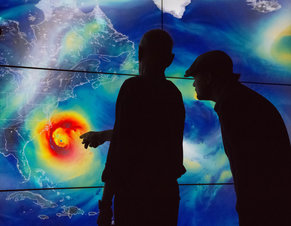|
| |
The uncertainty principle is a well known limit to scientific knowledge from quantum mechanics formulated in 1927 by physicist and Nobel laureate Werner Heisenberg. It states that we cannot know both the position and speed of a small particle such as a photon or electron with perfect accuracy because the more accuracy we obtain about position, the less we know about speed and vice versa. The following are common interpretations of the uncertainty principle.
Unknowable UniverseWhenever we proceed from the known into the unknown we may hope to understand, but we may have to learn at the same time a new meaning of the word "understanding.”
― Werner Karl Heisenberg, Physics and Philosophy: The Revolution in Modern Science The uncertainty principle is a concrete example of the limits of knowledge whereby there are things that are essentially unknowable.
Scientific DeterminismNot only is the Universe stranger than we think, it is stranger than we can think.
― Werner Heisenberg, Across the Frontiers Scientific determinism is the belief that the universe is a predictable machine such that the future is predetermined. This was a common viewpoint in the 19th century, even amongst scientists. However, in order to believe this now you must ignore well-accepted modern science in areas such as quantum mechanics, systems theory and chaos theory that all make it clear that the universe at the smallest and largest scales is probabilistic with an uncertain future.Pragmatic UseWe have to remember that what we observe is not nature in itself but nature exposed to our method of questioning.
― Werner Heisenberg The uncertainty principle can be extended into other areas with metaphorical thinking to be used as a pragmatic rule of thumb. If you try to measure a small particle, the measurement itself may have some influence over it. Similar problems occur in other domains. In business and the social sciences there is the hawthorne effect -- a tendency for people to change their behavior when they know they are being observed in a study. For example, if you are part of a productivity study you may become more productive simply because your productivity is being measured.Next: Examples of the Unknowable
Other interesting topics related to uncertainty:
If you enjoyed this page, please consider bookmarking Simplicable.
© 2010-2023 Simplicable. All Rights Reserved. Reproduction of materials found on this site, in any form, without explicit permission is prohibited.
View credits & copyrights or citation information for this page.
|

































